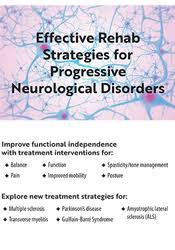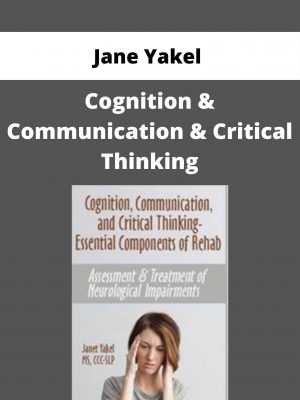Michel Janet (Shelly) Denes – Effective Rehab Strategies for Progressive Neurological Disorders
$200 Original price was: $200.$75Current price is: $75.
Shopping Instructions:
- DISCOUNT 15% : SHOP15
- Product Delivery: Within 1 – 12 hours after purchase.
You will learn the pathophysiology, signs, and symptoms of the various neurological disorders to develop effective individualized treatment interventions including some of the cutting-edge treatments coming our way.
Michel Janet (Shelly) Denes – Effective Rehab Strategies for Progressive Neurological Disorders
This informative and interactive recording, led by veteran Physical Therapist Shelly Denes, presents the etiology of specific neurological diseases, how the diseases progress, and effective goals and therapeutic interventions at the various stages of each disease. You will practice specific therapeutic interventions that Shelly has honed during her more than 40 years as a PT to help progress patients, promote functional independence throughout disease progression, and tackle problems that may surface during regression periods or complications of a disease. You will learn the pathophysiology, signs, and symptoms of the various neurological disorders to develop effective individualized treatment interventions including some of the cutting-edge treatments coming our way.
Explore new treatment strategies for:
- Parkinson’s disease
- Multiple sclerosis
- Transverse myelitis
- Guillain-Barré Syndrome
- Amyotrophic lateral sclerosis (ALS)
- Identify key components for evaluation and indications for proper treatment and planning for patients with progressive neurological diseases
- Discuss physiological changes in movement disorders to effectively implement successful rehab programming for these individuals
- Implement sensorimotor integration as a global approach to balance and postural adjustments
- Utilize assessment tools using balance strategy concepts and advanced balance techniques
- Identify and understand the difference between upper and lower motor neuron changes with these diseases
- Learn to utilize skills assessment and treatment skills in neurological, musculoskeletal, and orthopedic areas to improve function
Would you like to receive Michel Janet (Shelly) Denes – Effective Rehab Strategies for Progressive Neurological Disorders ?
SPECIFIC NEUROLOGICAL ASSESSMENT TOOLS
- Modified Ashworth Scale
- Sensorimotor testing
- Gaze stabilization
- Vestibulo-Ocular Reflex (VOR)
- Proprioception testing
- Romberg testing
GAIT ASSESSMENT & TRAINING: THE SIXTH VITAL SIGN
- Abnormal Gait/Falls
- Gait
strategies for “fallers” - Outcome Measures
- Gait speed
- Gait
- Advanced Gait Training and Skills
- Fall Recovery
- Barefoot Gait skills
NEWER REHABILIATION TECHNOLOGY
- Functional Electrical Stimulation Devices
- Foot drop
- Grasp and release
- Exoskeltons/Robotics for gait
- Orthotics for complicated cases
- Toe-off/push-off AFOs
SPECIALITY MUSCULO-SKELETAL INTERVENTIONS
- Soft Tissue/Friction/Deep Massage/Skin Rolling
- Cold Therapy and Ice
- Mobilization
EFFECTIVE NEUROLOGICAL TREATMENT TECHNIQUES
- Tone management
- Advanced ADLs
- UE apraxia and coordination interventions
- Fatigue management and energy conservation
- Gaze Stabilization Strategies
- Neuropathic Pain Management
- Posture, alignment, and coordination
- NDT (Neurodevelopmental Treatment)
ADDITIONAL TREATMENT CONSIDERATIONS
- The FallproofTM Balance & Mobility Program
- Aquatic therapy
- Targeted botox
PARKINSON’S DISEASE
- Altered sensory perception and activation
- Difficulty with changing strategies and dividing attention
- Tremors, rigidity, posture changes
- Decreased coordination and gait issues
- Improving akinesia and bradykinesia
- Rehab Treatment Planning
- Safe exercise treatment programs
- Balance
- Speed and amplitude movement
- Whole body and large movement exercises
MULTIPLE SCLEROSIS/TRANSVERSE MYELITIS
- Elevated core body temp
- Affective disorders and staging
- Neuropathies, weakness, and tone changes
- Balance, tremors, and coordination issue
- Invisible symptoms
- Weighted vests to address ataxia
- Endurance and energy management
- Rehab interventions & realistic goal setting
GUILLAIN-BARRÉ SYNDROME
- Miller Fisher syndrome
- Chronic inflammatory demyelinating polyneuropathy
- Multifocal motor neuropathy
- Address pain issues
- Long term effects
AMYOTROPHIC LATERAL SCLEROSIS (ALS)
- Upper vs. lower motor neuron
- Bulbar
- Respiratory
- Physical changes in patient
- Address goals realistically and treat wisely
PUTTING IT ALL TOGETHER
- Patient and family education
- Make the rehab fit your patients!
- Solutions for reimbursement challenges
Related products
NLP & Hypnosis
NLP & Hypnosis
NLP & Hypnosis
NLP & Hypnosis
Joseph Cohen – The SelfHacked Secrets To Understanding Why You Are Sick And How To Get Well
NLP & Hypnosis
NLP & Hypnosis
NLP & Hypnosis












